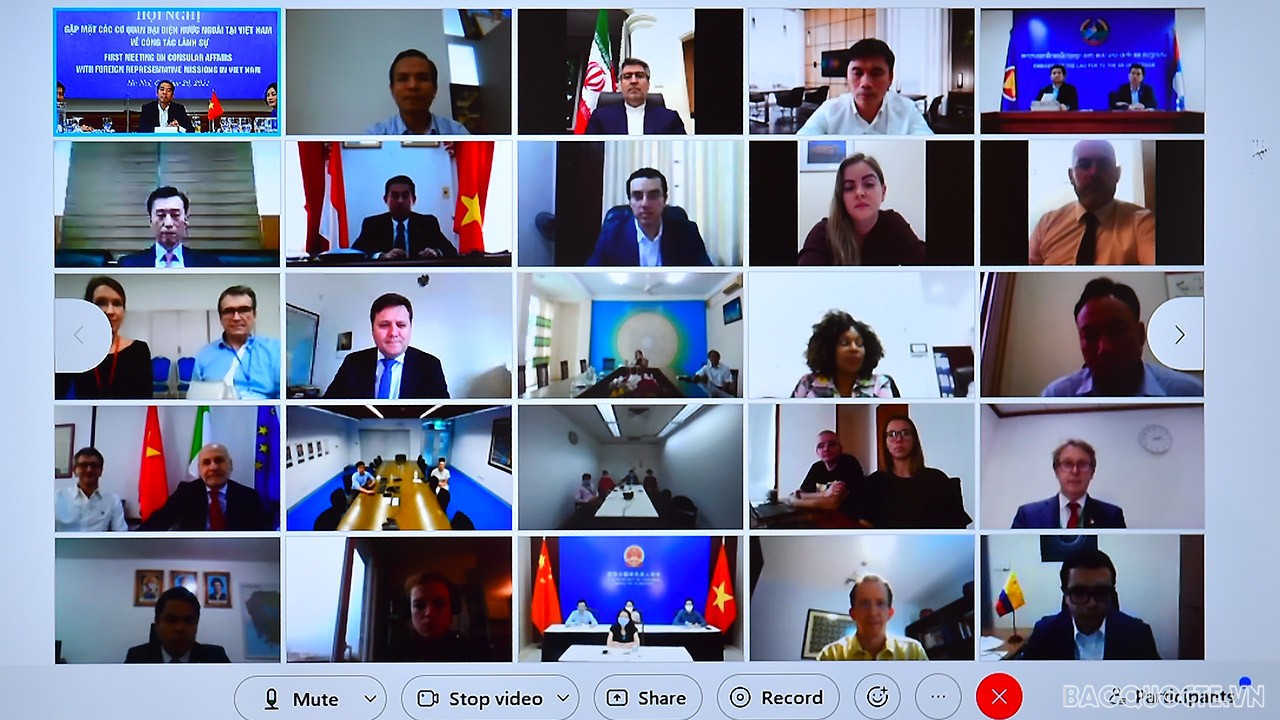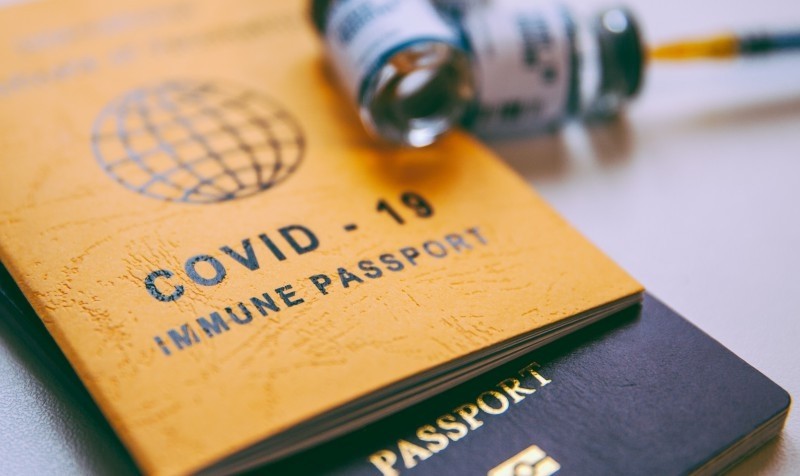
Foreign representative missions in Viet Nam to join in the fight against COVID-19
Latest
 |
| Representatives of foreign representative missions in Viet Nam exchanged views on a number of policies related to foreigners during the COVID-19 epidemic. (Photo: Tuan Anh) |
On October 11, 2021, the Government of Viet Nam adopted Resolution No. 128/NQ-CP promulgating the Interim Regulation on “Safe and Flexible Adaptation and Effective Control over the COVID-19 pandemic” to promptly adjust the strategy to respond to the epidemic.
According to Deputy Foreign Minister To Anh Dung, such policy adjustment is urgent when the pandemic situation changes.
In the coming time, the Ministry of Foreign Affairs as well as functional agencies from central to provincial levels will strive to accompany foreign representative missions in Viet Nam to solve problems arising in consular work.
Recommendations on quarantine procedures
In the discussions with the Ministry of Foreign Affairs, foreign representative missions in Viet Nam appreciated the country's strategy on safe and flexible adaptation and effective control over the COVID-19 pandemic, thereby proposing a number of recommendations on quarantine procedures for mission members entering Viet Nam.
Ambassador Pier Giorgio Aliberti, Head of the Delegation of the European Union (EU) to Viet Nam, said that living with COVID-19 and adapting to the new normal has become one of the right and drastic directions of Viet Nam.
Regarding the quarantine process, Ambassador Pier suggested allowing European diplomats and their family members who have been vaccinated against COVID-19 to stay at their places of residence and be self-responsible for complying with Viet Nam’s preventive and control measures, thereby helping to reduce the risk of cross-infection in the quarantined zone.
The suggestion got head nods from representatives of the Japanese Embassy, the Korean Embassy and the Swiss Embassy in Viet Nam. They said that being isolated at residence and working online under the full supervision of the head of representative mission would help diplomats keep on their regular work.
Mechanism of updating and exchanging information
The complicated development of the COVID-19 pandemic in Viet Nam has posed many challenges for foreigners in updating information on the number of infected cases (F0s) and their travel history, new strains of SARS-CoV-2, vaccination plan, immigration policy, etc.
In this regard, the representative from the Swiss mission stressed the need to maintain an official information channel on all issues related to the COVID-19 pandemic. A website can be launched to update information about the epidemic in Viet Nam, both in Vietnamese and English, for both Vietnamese people and foreigners.
With the information provided officially and timely by Vietnamese authorities, foreign representative missions can inform their citizens to strictly comply with regulations of COVID-19 preventing and controlling. They also can better protect their citizens in Viet Nam in necessary cases.
The attendee from the German Embassy emphasized the importance of providing information related to the COVID-19 pandemic in both Vietnamese and English.
For their part, the British Embassy in Viet Nam proposed setting up a hotline in English to respond to foreigners' inquiries on COVID-19 related issues.
 |
| So far, Viet Nam has temporarily recognised vaccination certificates or vaccine passports of 72 countries and territories worldwide. (Photo: Regulatory Review) |
Vaccination plan for foreigners
Currently, Viet Nam has been implementing the COVID-19 vaccination program for foreigners residing in the country, ensuring equal access to vaccines, regardless of their nationality, residency and employment status.
According to the preliminary statistics from localities, more than 43.000 foreigners in Viet Nam have been vaccinated.
Appreciating Viet Nam's policy and efforts in vaccinating foreigners, the consular representative of the Chinese Embassy in Viet Nam thanked the Vietnamese side for creating favorable conditions for the vaccination of Chinese citizens.
So far, many Chinese in Viet Nam have been granted green cards, helping travel, trade and people-to-people exchange between the two countries gradually return to normal.
Meanwhile, the representative from the British Embassy in Viet Nam also highly appreciated Viet Nam's efforts in vaccinating foreigners, including British citizens in Ha Noi and Ho Chi Minh City recently.
| “Promoting vaccination for people in Viet Nam and recognising vaccine passports is the reasonable policy of the Party and State both in terms of approaching and timing… The recognition of vaccine passports is the basis for formulating new entry policies, creating maximum favourable conditions for experts, investors and foreigners to enter Viet Nam, thus contributing to the successful realisation of dual goals of preventing the COVID-19 pandemic and promoting socio-economic development.” (General Director of Consular Department Nguyen Thi Huong Lan) |
Entry for other foreigners
While many countries around the world have achieved high vaccination rates and have started to issue vaccination certificates/vaccine passports, the Consular Department, the Ministry of Foreign Affairs has soon studied the experiences of other countries in deploying this special “travel permit”.
From August, the Ministry of Foreign Affairs, in coordination with the Ministry of Health, have agreed to temporarily recognise foreign vaccine passports and allow foreigners to use vaccine passports introduced to the Ministry of Foreign Affairs or authorized by Vietnamese representative missions abroad to shorten the quarantine time according to the guidance of the Ministry of Health.
The recognition of vaccine passports bears a great significance, contributing to marking the transition from "Zero Covid" strategy to "adapting, living safely with COVID-19" strategy on the basis of a high number of vaccinations, reducing the risk of death, thereby facilitating the implementation of pilot programs for vaccine passport holders in Quang Ninh and Phu Quoc in the near future.
To meet the urgent need to restart international travel activities, towards the full opening in 2022, some diplomatic missions have proposed to expand the entry for foreigners.
The representative from EU mission expressed his belief that adoptive families, students, and foreigners who applied for the family visa, would be eligible to enter the country. "I think this is in line with Viet Nam's strategy of living with COVID-19 and moving towards a new normal", he said.
Meanwhile, officers from the British Embassy and the United Nations Office on Drugs and Crime (UNOCD) expressed their wish that Viet Nam would continue to study the policies of other countries around the world and gradually loosen, easing visa re-issuance, as well as creating favorable conditions for technical experts and diplomats to enter Viet Nam for working purposes.
Participants from South Korea and China suggested that their citizens be allowed to visit relatives after Viet Nam resumes international flights, thereby promoting people-to-people exchanges.
On the basis of mutual understanding, cooperation and responsibility-sharing, the Ministry of Foreign Affairs acknowledges the above proposals, continues to accompany foreign representative missions in Viet Nam in tackling problems arising in consular affairs and overcoming challenges posed by the COVID-19 pandemic.












